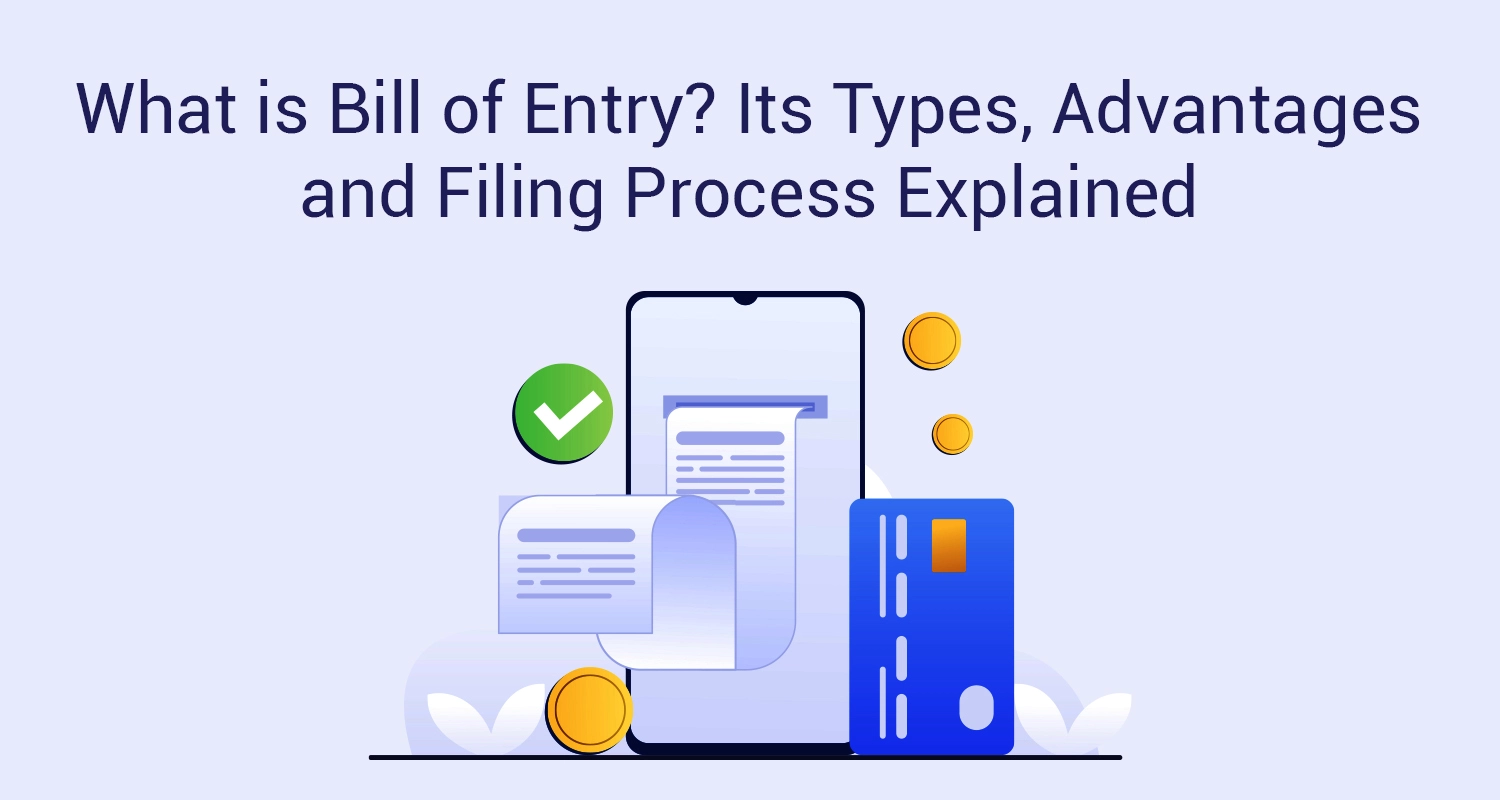GST Bill of Entry: Definition, Calculation, Types & Advantages
Table of Contents
Importing goods and commodities across borders is a common phenomenon in international trade. There are multiple procedures and laws that need to be followed. The Government of India has implemented the system of GST (Goods & Services Tax) to ensure a smooth, hassle-free and lawful importation. This system has laid down certain procedures and documentation requirements that the importer is expected to comply with. Among these documents, the Bill of Entry is one of the most crucial ones. So let’s find out the bill of entry meaning, its advantages, its types and how to file the bill of entry in GST system.
What is Bill of Entry?
A bill of entry is a legal document containing all the details regarding the consignment being imported into the country. In a way, it is a declaration by the importer to the customs authorities, namely CBIC (Indian Customs of Central Board of Indirect Taxes and Customs), regarding the details of the goods—their value, nature, quantity, etc. This bill of entry is supposed to be submitted to the concerned authority for assessment and clearance of the goods.Once the bill is filed, the customs officer will verify all the details, and the importer will have to pay various taxes, such as basic customs duty, IGST (Integrated Goods and Service Tax), and GST compensation cess. All this is done to clear the consignment.
What is Bill of Entry in GST?
When you are filling a bill of entry for your goods being imported from another country, you have to pay customs duties. However, along with the duty charges, your imported goods are also subject to GST, cess, and compensation cess. So, under the GST rules, goods imported into India (or from SEZ) are considered as a supply of goods under inter-state trade, thus attracting the levy of IGST (Integrated Goods and Services Tax).Calculation of IGST
The total value of IGST is the summation of:
- The value of imported goods before customs duty
- Customs duty levied by the government
- Any other duties or charges levied on the goods
Additionally, some luxury or demerit goods might be subject to GST compensation cess over and above the IGST
What is an ICEGATE Bill of Entry?
ICEGATE Bill of Entry is a way of filing the bill of entry online. The ICEGATE, or Indian Customs Electronic Data Interchange Gateway, is the national portal of CBIC that facilitates e-filing services for trade, importers, cargo carriers, and other trading partners via electronic mode.Sapna aapka. Business Loan Humara.
Apply NowWhy is filing a Bill of Entry important?
Filing a bill of entry is important for the following reasons:
- It ensures the legality of imported goods
- It helps in determining the appropriate taxes that need to be paid
- It helps while claiming IGST’s Input Tax Credit and Compensation Cess collected during Import.
What are the Types of Bills of Entry?
There are three major types of bills of entry as per the nature of the import and the intended use of the goods.
Bill of Entry for Home Consumption: This type of bill is used when the imported goods are meant for consumption (home or business) within the importing country. After filing, the goods are cleared for home consumption, and the importer qualifies to claim Input Tax Credit (ITC) for GST paid.
Bill of Entry for Warehousing: Purpose: Commonly referred to as a Bond Bill of Entry, this bill of entry is used when the importer does not wish to pay import duties at that very moment. It is up to the importer to pay the duties later. In such a scenario, the goods are stored in a dedicated warehouse until the import duties have been cleared.
Bill of Entry for Ex-Bond Goods: This type of bill is used by the importer when they wish to release goods from the warehouse after opting for warehousing. It is usually filed when the importer decides to clear the warehoused goods for home consumption.
What are the advantages of filing a Bill of Entry?
Filing the Bill of Entry offers several advantages. These include:
Clearance with Confidence: A Bill of Entry serves as your official notification to customs authorities regarding all the details about your import. If you provide accurate details, you ensure a smooth clearance process and avoid delays or penalties for non-compliance.
Accurate Duty Assessments: The Bill of Entry lays the foundation for calculating customs duty. With complete information, customs can determine the correct duty rate for your goods, saving you from overpaying or facing underpayment penalties.
Claiming Input Tax Credits: The GST system allows you to claim credit for taxes paid on business-related purchases. A valid Bill of Entry is an essential proof that you paid IGST on your import, allowing you to claim this valuable tax credit.
Quicker Movement of Goods: A Bill of Entry expedited customs clearance. Once processed and duties paid, your goods are released for transport, minimizing delays and getting them to their destination quicker.
Peace of Mind for Audits: The Bill of Entry serves as a permanent record of your import details, including value, duty paid, and GST compliance. Should you face an audit, this document provides clear evidence of your adherence to regulations.
Conclusion:
The Bill of Entry serves as a critical document for a seamless and compliant import process under the GST regime. It acts as a single point of communication with customs authorities, ensuring accurate duty assessment, facilitating tax credit claims, and expediting goods clearance. By understanding its different types and filing procedures, importers can navigate international trade with confidence and efficiency. Remember, a well-prepared Bill of Entry is your key to a smooth import journey.FAQs
Q1: Is a Bill of Entry required if the import is a small shipment?
Ans: Yes, a Bill of Entry is mandatory for all imported goods, regardless of value. However, the specific filing process might differ for low-value shipments. Check with customs for details on simplified procedures for smaller imports.
Q2: How long do I have to store a Bill of Entry after filing?
Ans: To be on the safer side, it's advisable to retain a Bill of Entry for at least seven years. So when you are being audited or there are any inquiries by tax authorities in the future, these bills of entry can come in handy.
Q3: Can I use one Bill of Entry for a large shipment that I am importing in stages, or do I need to file one for each arrival?
Ans: While a single Bill of Entry typically covers one consignment, there are provisions for filing multiple Bills of Entry for a larger import arriving in stages. You'd need to consult customs regulations for the specific details and ensure each stage has the necessary documentation.
Sapna aapka. Business Loan Humara.
Apply NowDisclaimer : The information in this blog is for general purposes only and may change without notice. It does not constitute legal, tax, or financial advice. Readers should seek professional guidance and make decisions at their own discretion. IIFL Finance is not liable for any reliance on this content. Read more




